Please find Michael’s excellent example of reading and note taking on the left. Again, whilst you need to develop your own style and approach, this shows the five steps very clearly.
Mr Kydd.
Please find Michael’s excellent example of reading and note taking on the left. Again, whilst you need to develop your own style and approach, this shows the five steps very clearly.
Mr Kydd.
All,
This episode of the excellenty oral history series looks at the establishment of Communism under Lenin and Stalin. A super introduction to this part of the course. You should think about continuity and change with Tsarism.
[youtube]http://www.youtube.com/watch?v=UZDXZBnsKRQ[/youtube]
Enjoy,
Mr Kydd.
As promised your group “perfect paragraphs” with our feedback can be found below for future reference. You may like to look at the other set’s efforts as well.
12D
12E
Prison of peoples –
Mr Kydd.
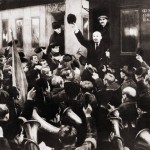 Please click here for an article form the Independent describing Lenin’s arrival in Russia in 1917. It is part of “history of the First World War in 100 moments series. An extract is included below…
Please click here for an article form the Independent describing Lenin’s arrival in Russia in 1917. It is part of “history of the First World War in 100 moments series. An extract is included below…
“The train that pulled out of the station at 3.10pm on the afternoon of Monday 9 April was like a missile, launched by the Germans, that would travel the long way around Europe to Russia, where it would deliver its incendiary human payload: Vladimir Ilyich Lenin.”
Mr Kydd.
I trust that the revision continue well. I am getting a steady stream of essay plans, and of course I am happy to look at anything you want me to. It was great to see so many of you at the revision conference on Wednesday. The powerpoint can be found here and the grouped past questions canbe found here.
Keep going,
Mr Kydd.
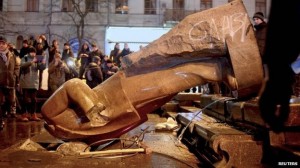 If all of the present developments between “Russian” Ukraine and “Ukrainian” Ukraine are hard to follow, then you might like to have a looks at the following. Here you can see a map to show how Ukrainian statues have been destroyed. Broadly it follows ethnic lines. This BBC report and this BBC magazine article explain the long history of idolatory in Russian and Soviet history.
If all of the present developments between “Russian” Ukraine and “Ukrainian” Ukraine are hard to follow, then you might like to have a looks at the following. Here you can see a map to show how Ukrainian statues have been destroyed. Broadly it follows ethnic lines. This BBC report and this BBC magazine article explain the long history of idolatory in Russian and Soviet history.
One final point – Lenin of course was of Tartar origin…
Mr Kydd.
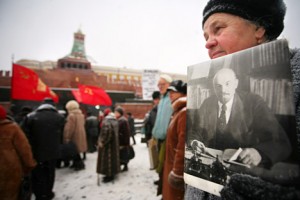 Please click here for an article from RUSSIA – beyond the headlines. It discusses modern views of Lenin, and the never-ending question of what to do with his body.
Please click here for an article from RUSSIA – beyond the headlines. It discusses modern views of Lenin, and the never-ending question of what to do with his body.
“Today’s generation of Russians have rather mixed feelings when it comes to the leader of the Bolshevik Revolution . The issue of burying Lenin’s body, which is still kept in a mausoleum in Red Square, comes up again and again. For the older generation, however, he remains an important historical figure, whereas young people are often unable to tell him from a comic book hero”.
Have a read and see what you think. It touches on the question – how much is a historian’s views of the past informed by the time in which he or she lives ? If this interests you, then search for my comments on AJP Taylor on the main site.
Mr Kydd.
 You may remember in the last week of the summer term we watched the 1955 cartoon version of Animal Farm as part of your introduction to the Russian dicatorships course. What I did not realise at the time was that although a British film, it was paid for by the CIA. This article by Karl Cohen in The Guardian explains the remarkable story of how US intelligence secretly funded the landmark British movie. Animated propaganda was not of course new (it had been widely used in the Second World War), but what makes this noteworthy for me is that this was a huge box office success and critically acclaimed.
You may remember in the last week of the summer term we watched the 1955 cartoon version of Animal Farm as part of your introduction to the Russian dicatorships course. What I did not realise at the time was that although a British film, it was paid for by the CIA. This article by Karl Cohen in The Guardian explains the remarkable story of how US intelligence secretly funded the landmark British movie. Animated propaganda was not of course new (it had been widely used in the Second World War), but what makes this noteworthy for me is that this was a huge box office success and critically acclaimed.
This certains helps to explain the diversion from the Orwell book. In terms of the chronology of our course, we should refelct that it would have been made when Stalin was still alive, when the Korean War was still raging, and before Khrushchev started to speak of peaceful co-existance.
Maybe it is worth rewatching it with this iinformation in our heads.
Mr Kydd.
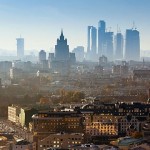 I have spoken to you before about the excellent BBC Radio 4 series Russia: The Wild East by Martin Sixsmith. The second series is presently being rerun, and it has just got to Khruschev.
I have spoken to you before about the excellent BBC Radio 4 series Russia: The Wild East by Martin Sixsmith. The second series is presently being rerun, and it has just got to Khruschev.
Writing meaningfully about Khrushchev is something that students often find demanding on the synoptic paper, so you may wish to listen to the two following fifteen minute programmes – The rise and fall of Khrushchev and The Secret Speech.
The programme description is included below.
Martin Sixsmith walks down Cosmonauts Alley in Moscow where plaques and statues commemorate the achievements of the Russian space programme.
He uses archive recordings from 1961 when Yuri Gagarin became the first man in space. The USSR had beaten the US, and Khrushchev claimed vindication: “once-illiterate Russia has pioneered the path into space. Let everyone who has sharpened their claws against us know this!” He was determined to prove the USSR equal to the US, but he struggled to modernize and the Soviet Union remained a police state. He insisted the era of socialist struggle was over and fancifully predicted Communist perfection by 1980.
Having committed himself to big improvements in living conditions he had to start delivering, but Shostakovich’s operetta Cheryomushki shows just how far the Soviet Dream had diverged from the reality of everyday life. The economy was slow to respond to Khrushchev; with few incentives to work hard, people joked ‘they pretend to pay us and we pretend to work.’ With agriculture failing to meet the country’s needs, Khrushchev embarked on a series of disastrous grand schemes but still had to cut the defence budget to buy food. Perceived military vulnerability lead to thawing relations with the West, but Khrushchev continued to bluff and intimidate.
He told Western ambassadors that the triumph of communism was inevitable. “Like it or not,” he said, “history is on our side. We will bury you.” But humiliation in Cuba undermined his authority. While on holiday on the Black Sea in October 1964, he was summoned to Moscow and forced to resign. “I’m old and tired”, he told a friend. “Let them cope by themselves. I’ve done the main thing. The fear has gone now; we can talk as equals. That is my contribution.”
Mr Kydd.
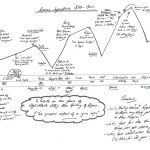 As we are now onthe brink of writing our first fully synoptic essays on the peasants I think it would be helpful to return to our agriculture timelines.
As we are now onthe brink of writing our first fully synoptic essays on the peasants I think it would be helpful to return to our agriculture timelines.
Task :- Have a look again at the timeline. Now that you understand this theme what do you think of it ? In pairs discuss it and post a comment below thinking carefully about the relative positions of the key events. Make sure that you explain your reasons behind your comments.
Mr Kydd.